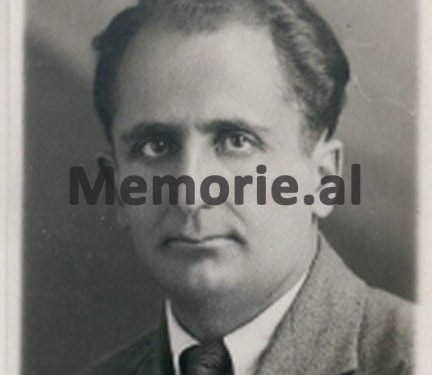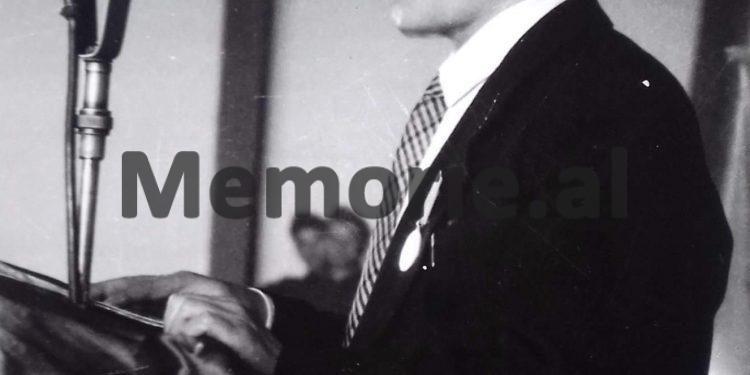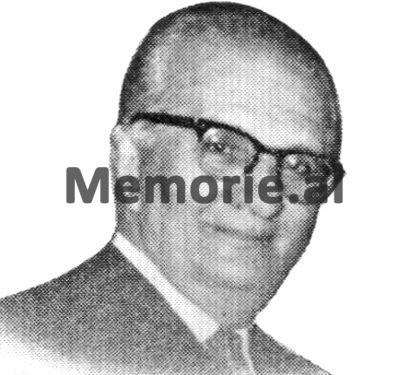Dashnor Kaloçi
Memorie.al publishes two unknown letters of Sejfulla Malëshova, former Minister of Culture in the communist government of Enver Hoxha, in the years 1945-1946, who is 1928, when he was studying in the Soviet Union, with a scholarship given by KONARE, he wrote to his comrades of the communist group. What is said in those two letters and who were the other members of that communist group, whom Faik Konica called “agents of Bolshevism”, who one day would return home and set fire to Albania!
“You there should be the center of the Soviet Union branch of our group. This branch, in our minds, should be governed by a secretary. As secretary, we propose Demir Godel. On the work of the secretary, i.e., who do you think it should be, write to us and thus decide once and for all the branch starts working? We are also members of the General Commission of the branch, and as such the monthly payments, etc., will be sent there. The branch will use its income as for the needs of the branch and will send the rest to the general center. With Naum, you have to get straight into the relationship. “You in Moscow have to meet often in official meetings and talk about the work of the Group.”
This is what is written, among other things, in one of the two letters recently found in the Central State Archive in Tirana, where Sejfulla Malëshova (former first Minister of Culture in the communist government of Enver Hoxha in 1945-’46) sent them his comrades of the communist group, in 1928, when he was studying in the Soviet Union, after the scholarship given by the National-Revolutionary Committee (KONARE), chaired by Fan Noli.
But what was the National Revolutionary Committee when it was formed? Who led it and what was its political activity? What is written in the two letters of Malëshova (which we are publishing in full below in this article) and who were the other members of that communist group, about whom, Faik Konica said that one day they will return home and will to set fire to the whole of Albania ?!
What was KONARE?
After the return of Ahmet Zogu to power, at the end of December 1924, almost most of his political opponents, who were implicated in the coup of June of that year, or as it is otherwise known by the propaganda and historiography of the communist regime of the pre-1990s, such as the “Democratic-bourgeois revolution of June 1924”, which overthrew the legitimate government of Shefqet Vërlac by force of arms, were forced to leave Albania.
Most of them settled mainly in Bari, Italy, where they also gained the status of political asylum, as well as in France and Austria. The main group of Zog’s most sworn opponents settled in Vienna and from the Austrian capital they decided to continue the fight to overthrow the government of Ahmet Zog, which had emerged from the free elections of January 1925.
In this context, they tried to find potential allies, where they would rely on to continue their fight against Ahmet Zogu. Thus, part of Vienna’s anti-Zogist political diaspora, led by Fan Nolin, decided to rely on the Soviet Union, which at the time also played a leading role in the communist movement around the world.
After that, this group sent a letter to the Soviet government, in which they asked for moral and political support in the fight against the Zog regime, which they called a reactionary government. After that, this group established ties with the Balkan Communist Federation and through it with the Communist International (Comintern). After that, relying on the help of the Balkan Federation, this political group led by Fan Noli, on November 25, 1925, organized a conference in Vienna, which also represented various currents of the Albanian political diaspora that had settled in the states. Different Europe.
At this meeting, the National Revolutionary Committee (KONARE) was formed, which was chaired by Fan Noli. In this committee, in addition to its chairman, Fan Noli, participated and Halim Xhelo Tërbaçi, Omer Nishani, Riza Cerova, Kostandin Boshnjaku, Lano Borshi, Dr. Nush Bushati, Aziz Çami, Bedri Pejani, Ibrahim Jakova, etc. Where a political group, after this meeting intensified, even more, the fight against Ahmet Zogu, especially through his newspaper, “Liria Kombëtare”, led by Lano Borshi and Halim Xhelo, which they published in Geneva.
At that time, thanks to the connections that KONARE established with the Soviet Union, it became possible for 14 Albanians to study in Moscow and Leningrad. These students were: Ali Kelmendi, Asllan Pejani, Qamil Çela, Fetah Ekmekçiu, Demir Godelli, Xhevdet Meqemeja, Ymer Domi, Naum Prifti, Rexhep Filati, Reshat Këlliçi, Reshit Daçi, Sejfulla Malëshova, Selim Shpuza, and Haki Stërm.
Then, in April 1927, this political group called KONARE changed its name to the National Liberation Committee. In the early 1930s, some of the main leaders of the National Liberation Committee, such as Ali Kelmendi, Omer Nishani, Riza Cerova, Halim Xhelo, etc., returned to Albania, but without being able to organize in at that time they did not have any prominent communist activities.
During the years of the communist regime, the activity of KONARE was manipulated and falsified, and in the book “History of Albania”, its truth was not reflected. Thus, the activities of its main leaders, such as Lano Borshi, Ibrahim Jakova, Aziz Çami, etc., who during the following years did not follow the communist movement, which had started in their youth, were removed at all and were not reflected. In addition, in the book “History of Albania” (1984 edition) was almost completely falsified and the statement of KONARE, which was signed at the meeting of April 24, 1927.
Konica v. KONARE
The activity and activity of the political group included in the National-Revolutionary Committee, led by Fan Noli, in addition to the reaction it aroused in the government of Ahmet Zogu, there was also a lot of criticism from diaspora personalities. One of them was Faik Konica, who at that time headed the patriotic society “Vatra”, which consisted of Albanian immigrants settled in the US.
In the newspaper “Dielli” (Boston, Saturday, May 15, 1926), published by the “Vatra” Society, regarding the activity of the political group of Fan Noli and their connections with the Soviet Union, Faik Konica wrote, among other things: Oral news has taken recently, we summarize these mice Bolshevik propaganda among Albanians. As far back as St. Andrew’s 1924, Bolshevik propaganda in Albania was in the hands of an Albanian raised in Russia, a thin, skillful man and apparently convinced of the goodness of Bolshevik theories.
Fan Noli in this propaganda as in everything else, the former was just a face of the second set. The first test of loyalty that this small group gave to the Soviets, was Fan Noli’s ridiculous word in the League of Nations, a word liked in Bolshevik Russia, but very harmful to Albania. With the return of legality to Albania and the departure of Fan Noli abroad, the center of Bolshevik propaganda was naturally transferred abroad.
The refugees, as long as they had money from those they had brought from Albania, did not try to find other sources. But the money ran out quickly: and immediately began talks with the Soviets on aid, talks that took the pound they liked. In addition to the special “propaganda” sums given to some leaders of the movement, the Bolsheviks tied up their salaries and some to the fugitives, ordered by the leaders: caves give them 400 gold francs ($ 80) a month, some others from 500 gold francs, ($ 100).
Then, taking into account the revolutionary developments that the troublemakers hope to make further in Albania, the Bolshevik government asks the enemies of our State to send a dozen Albanian boys to the special school in Moscow, where the agents of Bolshevism are formed. . “These strange students were sent and are now in Moscow, where they systematically learned the craft of revolution to set fire to their country tomorrow or fall into the hands of the police and lose their lives for dog fat.”
The first letter of Sejfulla Malëshova
Leningrad 28.01 1928
Dear friend
Along with this, we are starting the translations, or rather the prefaces only, because as I know, they want to know what we have written. Be sure to go to Kollorov, talk to him on behalf of the group, and ask what he does with the statute and the instructions they are preparing. Then ask about Fundon, then tell him that after the letters we received, he understood the issue well and that we should be in contact with him, otherwise we have no way to be in the course of Albania’s affairs. Tell him why they did not send the letter we wrote to Fundos and try to find out when the work of the statute will end apocrosimally. If this is going to last long, then tell them what they think of the group and after the letter, we have a good understanding of the intentions of the K J (Yugoslav Communists) and our mistakes.
I believe that Kollorov will have come there by now and you try your best to find him. And with the translation work, he asked how they intend and when to publish them. Tell Hoxha to make us the statements of a letter, in which he will show the reasons for his abstention, when the resolution was voted and the condemnation of Shpuza, together with this version of his të hot talks that you had with him and Rexhepi with him.
We ask this because two friends of the group Godel and Filati complain about him and one of them, Godel, says that Hoxha motivates his abstention as follows: behind the nose and that only Hoxha, steadfast as a rock, did not fall into this intrigue!
We want to know what Hoxha says about this accusation that is being made against him. What happened to Ramos? Did you join the party? When you write to us you should keep in mind our letter and reply to us point by point. And go to Boris, did you find the book on the issue of those in Albania? For newspaper work, write to Qerim if he is interested in sending it to us.
Greetings to friends
With longing Sejfulla Malëshova
The second letter of Sejfulla Malëshova
Leningrad, 25. IX. 1928
Dear friends, we are here to work and we believe that in a month and a half both the Alphabet and the Communist manifesto with all the notes will be ready. In addition, Zavalani made several copies of the Statute on the machine, which he translated into Russian for the Comintern. We are sending you a copy. Zavalani translated Russian instructions for KJ. We are sending you an Albanian copy of the instructions. How do you come up with translations? You just have to be more discriminating with the help you render toward other people. Fundos is not being heard crying seems to have fallen gently there in the south. When he comes, do not forget to tell him that he must come here by all means.
Kajnon that we could get to the station that evening that left. What did Rexhepi do? Do you overcome the risk of the doctor or not? You there must be the center of the Soviet Union branch of our group. This branch, in our minds, should be governed by a secretary. As secretary, we propose Demir Godel. On the work of the secretary, i.e. which do you think it should be, write to us and so once a good decision is made and the branch starts working.
We also of Komis, of Pergj. We are members of the branch and as such we will send the monthly payments etc. there. The branch will use its income as for the needs of the branch and will send the rest to the general center. With Naum you have to get straight into the relationship. You in Moscow have to meet often in official meetings, to talk about the affairs of the Group. We must strive for everyone to take an active part in the general cause and to feel that he is not an isolated man, but an organized man, a member of a militant organization. We decide as any of you month by month and regularly send you from 5 rubles.
So you should know that none of you have to send these to you, but because it is required by the organization. And you have the right to claim to be sent to you properly. Shuaip Hajnua will take them from Reshat Këlliçi, Salih Hoxha from Selim Shpuza, Rexhep Filati from Tajar Zavalani, Demir Godel from Sejfulla Malëshova. We are sending Shuaip my minutes of the election of the Commission. Let him give us his opinion. We are waiting for an answer “.
For the General Commission
S.Malëshova
From minister to tobacco storekeeper, the story of Sejfulla Malëshova, one of the most liberal communists, who fell victim to his ideal!
Sejfulla Malëshova was born in 1903 in the village of Malëshovë in Përmet, where his family comes from. After finishing primary school in his hometown, Sejfullai went to Italy, where he attended the Arbëresh college of Calabria in St. Miter Corona. After graduating from that college, he returned to Albania and joined the revolutionary organization “Union”, which was founded by Avni Rustem.
Like many other young people of this organization, Sejfullai participated in the coup since the historiography before the ’90s is known as the “June Revolution” of 1924 and after his triumph, he worked for about six months as secretary to Prime Minister Fan Noli.
After Zog’s return to power, in December 1924, Sejfullai left Albania. He first settled in Italy and then in Vienna, Austria. In 1926, with the help of KONARE, led by Fan Noli, he received a state scholarship from the government of the Soviet Union and for five years continued his studies at the Faculty of Philosophy in Moscow.
After graduating in 1931, he was elected head of the association of Albanians studying in the Soviet Union. From 1931 to 1941, Sejfullai worked in Moscow at the COMINTERN, as well as a lecturer at the faculty where he studied himself. During that period, thanks to the foreign languages he possessed, he was sent by the Comintern on various assignments to several countries of the world.
After a long emigration, Sejfullai came to Albania in March 1943, after staying around France for about two years. After staying for some time in Tirana illegally, Sejfullai participated in the First Conference of the Communist Party of Albania held in Labinot, where he was elected a candidate of the Central Committee. When the German winter operation began, he went to the mountains and stayed with Enver Hoxha and the General Staff until the end of the War.
In October 1944, at a meeting in Berat, he was elected to the first provisional government headed by Enver Hoxha, taking the post of Minister of Culture and Press. He held this post until February 1946, when he was expelled from the Politburo and the Central Committee at the 5th Plenum. This came as a result of the power struggle that was taking place at that time within the top communist leadership, where Enver Hoxha, among other things, is said to have seen Malëshova as the main rival for the leader of the SNP.
After that, for ten years he worked as an economist at the National Bank in Tirana, and in 1956, he was first interned in the town of Ballsh, where he was left to live in an old barracks. During this time (in 1949) Malëshova was expelled from the League of Writers and Artists, being described as an “anti-party element”.
Shortly after moving to Ballsh, he was allowed to live in the town of Fier, working as a leather storekeeper and then smoking in an Agricultural Enterprise. Sejfullai lived completely alone until he died in deep misery in 1970 and only his sister, who came from the village, and his two nephews attended his funeral./Memorie.al
















